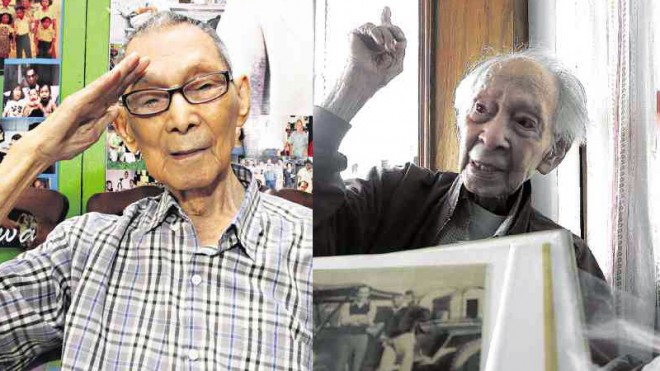Brothers oldest war veterans

BAND OF HEROES Dr. Jose P. Javier (left), 104, and his brother civil engineer Fernando Javier, 106. EV ESPIRITU/GRIG C. MONTEGRANDE
BAGUIO CITY, Philippines—Two brothers are considered the oldest living war veterans and survivors of the gruelling Bataan Death March on April 9, 1942. Civil engineer Fernando Perez Javier, a University of the Philippines alumnus, is 106 years old, while his brother Dr. Jose Javier, who graduated from the University of Sto. Tomas, is 104.
At 106, Fernando Perez Javier has lived long enough to witness World War I and fight in the second World War.
Today, he spends his days seated by his window, recalling the days when he was a builder first before he became a warrior.
Born on Dec. 22, 1907, the retired government engineer and third lieutenant of the United States Armed Forces in the Far East (USAFFE), is considered the oldest living World War II veteran and survivor of the 128-kilometer Bataan Death March on April 9, 1942.
It was in the detention camp in Tarlac province after the grueling trek from Bataan province that Javier met his younger brother, Dr. Jose Javier, now 104, and learned that his sibling had also endured the ordeal along with thousands of Filipino and American prisoners of war.
In an interview with the Inquirer at his home in Camdas village here, Javier had to catch his breath every time he spoke, as he had just spent 11 days at a hospital recovering from pneumonia. His hospital stay annoyed him, he said, as it prevented him from spending his best hours reading a newspaper and watching the world go by from his living room window.
Contrary to expectations, war was not Javier’s favorite topic. He’d rather talk about his role in building roads in Puerto Princesa City, Palawan province. He also amused himself by trying to recall the names of the people he had worked with as an engineer.
Asked about the Death March, he shrugged: “If you behaved, the [Japanese soldiers] did not harm you, so we behaved.”
The American and Filipino soldiers who were killed or who died on the way to Camp O’Donnell in Capas were those who became delusional or hysterical from the heat and from starvation, he added.
Terrible
“War is terrible,” Javier said. “I was in Grade 1 when World War I ended.”
Javier was one of the first engineers to graduate from the University of the Philippines. At 19, he served as assistant district engineer in Puerto Princesa.
“My first assignment was in Cagayan province … Puerto Princesa was where we made roads,” he said.
“But the world situation soon [started] getting dangerous,” he added. “I received a telegram to [surrender] all my responsibilities as a government engineer … so I could be inducted into the USAFFE.”
He remembered news reports about the Philippine government’s request for the United States to send Gen. Douglas MacArthur to help organize a Philippine army. “We did not have an army. We only had the constabulary,” Javier said.
6 years in Okinawa
Forced to surrender with the rest of the Allied soldiers in 1942, the war veteran said he coped by thinking about his family. “When I left to fight the war, I had two children, ages 5 and 7. I retired after the war, but it was hard to get another job,” he said.
Javier said he worked for six years in Okinawa, Japan, and visited Korea. He was also briefly stationed in Afghanistan as an engineer.
But he always returned home to Baguio City, he said.
Javier recalled the Baguio of his time as a place conducive to walking. “There were no people. There were no cars. I walked to the market (from Camdas),” he said.
Another time
These days, he feels like a man from another time, he said, referring to the strangeness of the summer capital dominated by large television screens and mobile telephones with Internet access.
He refuses to watch television, except to catch the news, he said.
“That invention is a curse to young people,” he added.
The Internet is an abominable concept, he groused.
But Javier also recalled comforting moments like the time when President Aquino helped him remember a meeting he had with the late President Corazon Aquino in La Union province, when she ran against former President Ferdinand Marcos in the 1985 snap elections.
“The President (Benigno Aquino III) was still in shorts,” he said, chuckling.
Belief in God
Like most war veterans, Javier occasionally thinks of conflicts, especially those involving terrorism and religious strife. But they puzzle him, he admitted.
“I think if every religion believes in a god, this world [would] be all right,” he said.
RELATED STORIES
Did you know: Philippine Veterans Week
Tribute run draws fewer war veterans














